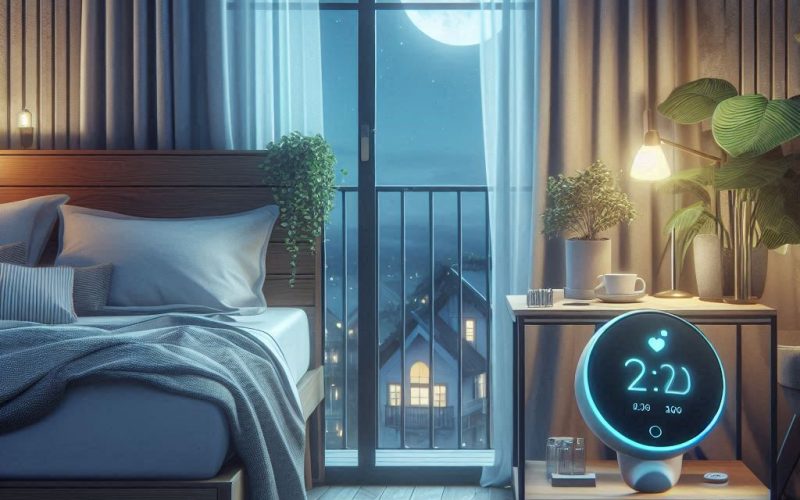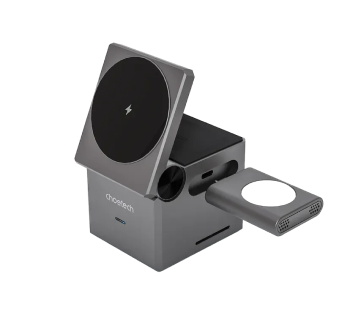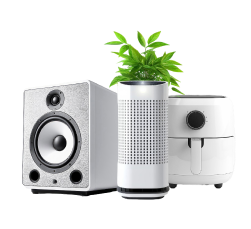Getting a good night’s sleep is crucial for maximizing productivity and avoiding fatigue. Lack of sleep has several adverse consequences. For one, it leaves you feeling burned out with barely enough energy to handle daily tasks like chores and errands. Also, it diminishes your motivation for physical activities, which can further impact your overall well-being.
Sleep trackers provide insight into your sleep phases and help identify sleep trends. High-end models can also monitor your heart rate and activity levels, increasing your overall health awareness.
If you’re looking for a high-quality sleep-tracking device, you’ve come to the right place. In this article, we will cover what sleep trackers do, discuss key features to look for, and help you choose the best one from our selection of the top 6 best sleep trackers. Without further ado, let’s dive right in!
Table of Contents
What is a sleep tracker?
A sleep tracker is a device (or application) that monitors and analyzes sleep patterns and quality. These trackers use various technologies such as accelerometers, heart rate monitors, and even sound sensors to collect data during your nightly recharge.
The best sleep trackers listed in our article can help you understand your sleep habits and identify any potential issues that may affect your overall health. By using these devices, you can gain valuable insights and make smart adjustments to improve your sleep patterns such as adjusting bedtime routines, improving sleep environment, or seeking medical advice for sleep disorders.
If you’re also interested in comprehensive sleep monitoring, consider our recommendations for the best fitness trackers.
Sleep trackers collect data on various sleep stages (light sleep, deep sleep, and REM sleep) and track disruptions during the night, such as waking up or moving around. The data is then processed and displayed in a user-friendly format, usually through a companion app.
Now let’s swiftly discuss the best sleep trackers in 2024.
6 Best Sleep Trackers to Look for in 2024
Oura Ring Gen3
Product Description: The third-generation Oura Ring stands as one of the best sleep trackers for its comprehensive data and user-friendly daily guidance. It excels in measuring heart rate and variability with a clear, user-friendly interface. However, those needing extensive workout and movement tracking might want to opt for other devices.
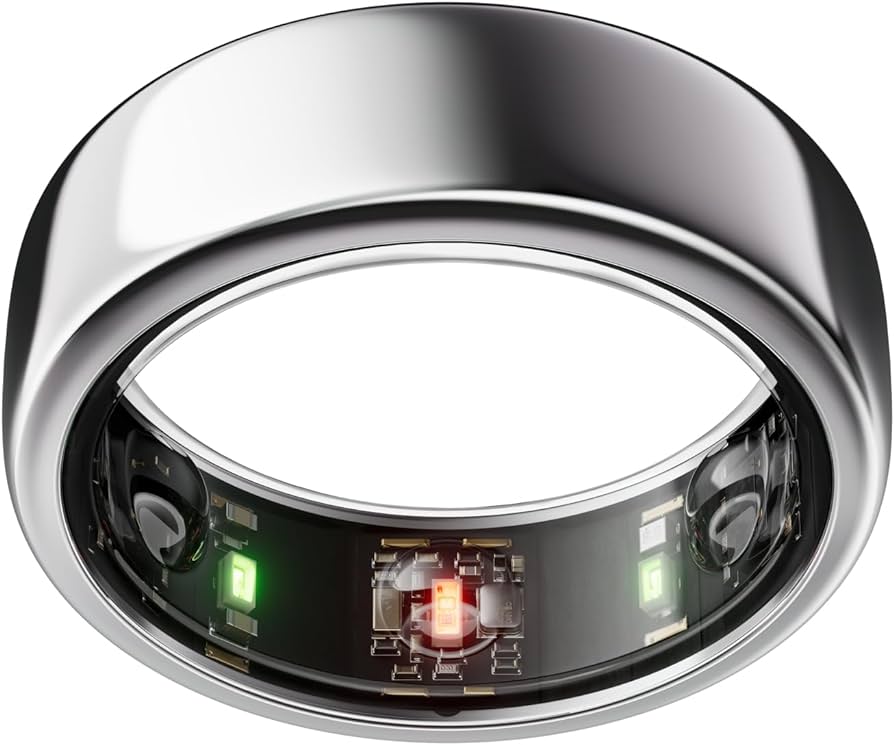
Key Features and Specs: This sleep tracking ring stands out due to its extensive range of features enabled by research-grade sensors. It monitors over 20 biometrics including sleep quality, activity levels, heart rate, and stress levels. It seamlessly integrates with more than 40 apps and is compatible with iOS and Android platforms. This ring is also crafted from durable, lightweight titanium and is hypoallergenic and water-resistant.
Pros: The Oura ring offers accurate sleep tracking with insightful suggestions for improving sleep quality, along with a durable build and comfortable fit, even when fingers swell.
Cons: Some users find stress monitoring and workout tracking less reliable, and the basic period tracking feature could be more detailed. Also, the monthly subscription may deter potential buyers despite the overall quality of the product.
Price: $299
Product Link: Amazon
Whoop 4.0
Product Description: The Whoop 4.0 is a screenless wristband tracker ideal for those focused on tracking sleep and workouts, and is widely considered one of the best sleep trackers. It uses photoplethysmography (PPG) and an accelerometer and accurately monitors heart rate, heart-rate variability, and sleep stages with its proprietary algorithm. It then sends the data to its companion app.
![]()
Key Features and Specs: The WHOOP 4.0 features a 12-month membership, hardware, an Onyx SuperKnit band, and a waterproof battery pack. It monitors heart rate, respiratory rate, sleep, and more. The app offers personalized insights, tracks daily behaviors via the WHOOP Journal, and supports a community of athletes and fitness enthusiasts to meet health goals.
Pros: This model offers sleek design, comfort, and comprehensive functionality including accurate monitoring of steps, distance, calories, and sleep patterns. It syncs with smartphones for better connectivity and productivity.
Cons: The tracker's strain and recovery metrics may not accurately reflect workout intensity or recovery levels. It lacks a display for basic info like steps, and its subscription model and customer service are seen as cumbersome compared to Garmin or Fitbit.
Price: $239
Product Link: Amazon
Garmin Epix Pro (Gen 2)
Product Description: The Garmin Epix Pro (Gen 2) is among the best sleep trackers with a 1.4” always-on AMOLED display and steel bezel, perfect for larger wrists. This smartwatch includes built-in features like an LED flashlight, hill score, endurance score, and comprehensive sleep monitoring to enhance your training, recovery, and overall wellness.
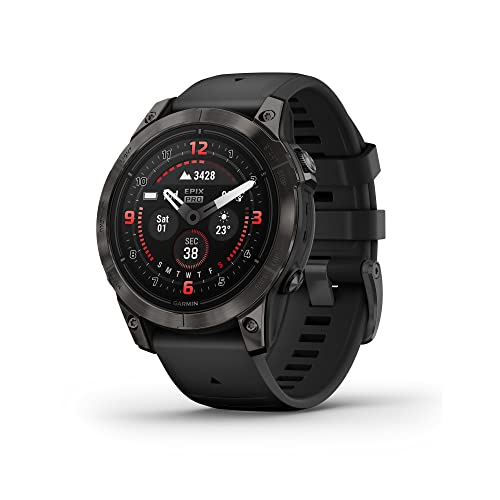
Key Features and Specs: It offers comprehensive health monitoring with 24/7 HRV status and advanced sleep tracking capabilities. This smartwatch is compatible with both Android and iOS devices. It also features 16 GB memory storage and extra features like built-in GPS, touchscreen interface, and Bluetooth connectivity for swift integration with your smartphone.
Pros: This sleep tracking smartwatch offers advanced features like blood oxygen monitoring and EEG. With a faster processor response and a robust design suitable for all-day wear, it’s an ideal option for many users.
Cons: Some users have reported missing expected features like ECG, and find the screen challenging to read during workouts. The smartwatch doesn’t include a ECG feature, which some users may need for detailed health monitoring. For ECG functionality, consider alternatives like Apple Watch Series 9.
Price: $999
Product Link: Amazon
Apple Watch Series 9
Product Description: The Apple Watch Series 9 is another great sleep tracking device. Compared to its predecessors, this model features custom silicon that enhances its capabilities, intuitive functions, and speed.
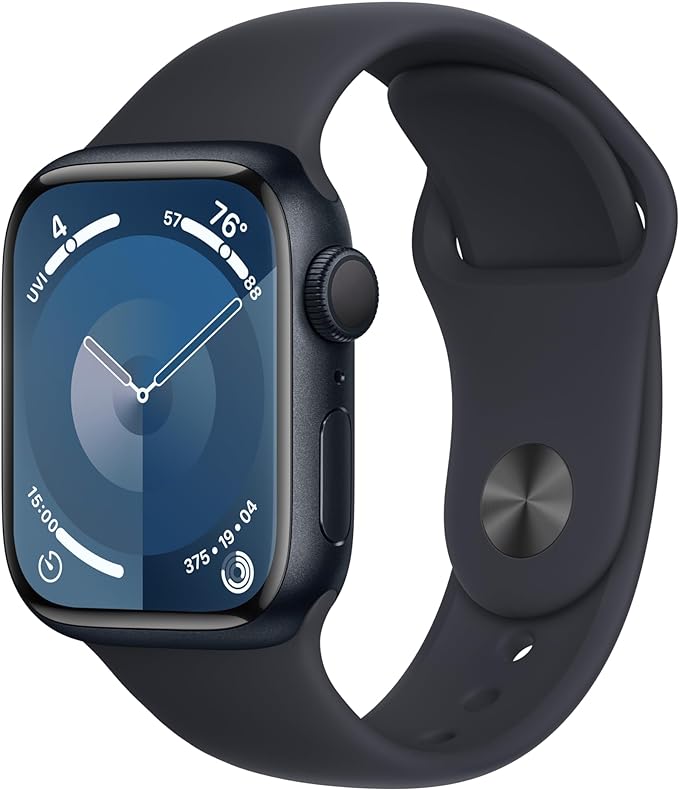
Key Features and Specs: This smartwatch features a dual-core CPU with 5.6 billion transistors, 60% more than its predecessor, and a four-core Neural Engine for faster machine-learning tasks. It includes advanced health monitoring (ECG, sleep tracking, temperature sensing), safety features (Fall Detection, Emergency SOS), IP6X dust resistance, and 50m water resistance.
Pros: The smartwatch blends elegant design with practical GPS tracking, heart rate monitoring, and a long-lasting battery that makes it an ideal choice for daily use and fitness tracking.
Cons: It excels in GPS tracking and heart rate monitoring, but lacks detailed sleep tracking features compared to some competitors in its class. The smartwatch tracks your sleep stages (deep, REM, core) and respiratory rate, but for more advanced sleep analysis, consider Oura Ring or Whoop 4.0.
Price range: $299-$399
Product Link: Amazon
Fitbit Inspire 3
Product Description: Fitbit Inspire 3 is the best sleep tracker for those tight on budget. It is designed to enrich your lifestyle with effortless health tracking and connectivity. From automatic sleep monitoring and stress management features to a lightweight design and long battery life, it helps you to stay active, relaxed, and informed throughout your day and night.
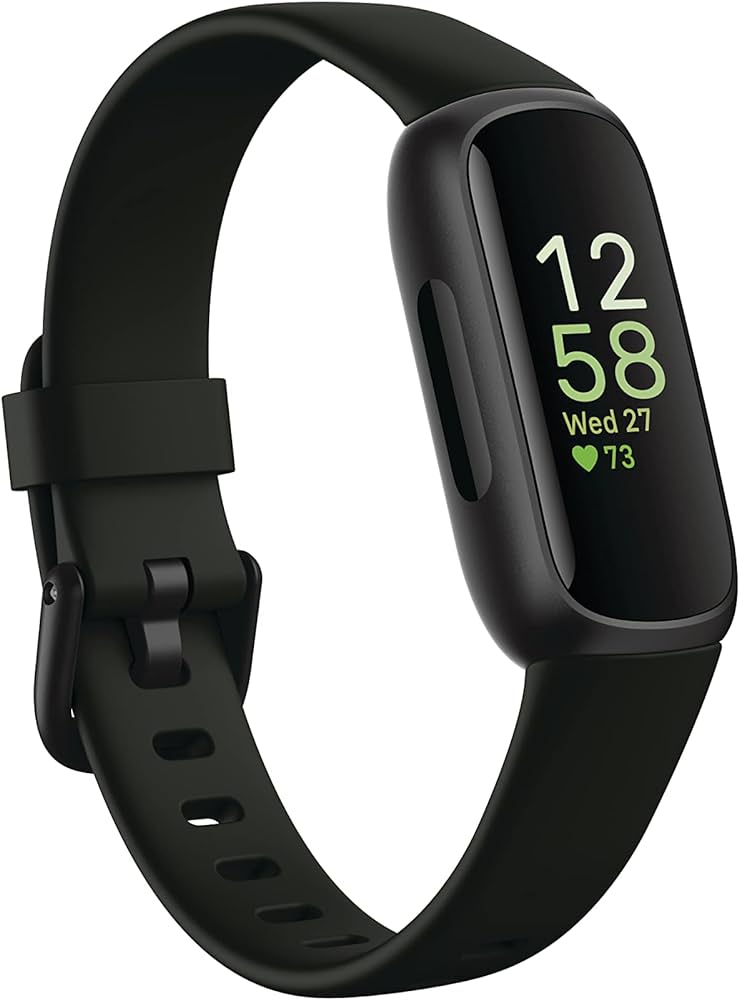
Key Features and Specs: The device features automatic sleep tracking with a personalized Sleep Profile and daily Sleep Score. It tracks your activity all day, monitors your heart rate around the clock, and lets you receive calls, texts, and notifications. It features a color touchscreen with customizable clock faces, lasts up to 10 days on a single charge, and works with Apple iOS 15 or higher and Android OS 9 or higher.
Pros: The Fitbit Inspire 3 impresses with its compact size, responsive touch display, and reliable functionality at a lower price compared to the Charge 6 and offers up to 8-9 days of battery life.
CONS: Some users reported issues with the uncomfortable silicone wristband and accuracy problems during activities like treadmill walking. Customer service was friendly but lacked effective solutions, and the app's functionality and data accuracy were disappointing to some.
Price: $99
Product Link: Amazon
Withings Sleep Tracking Mat
Product Description: Withings Sleep offers comprehensive sleep analysis, including tracking sleep stages (deep, light, and REM), heart rate monitoring, and snoring detection. It features an easy setup process and seamlessly syncs data to the Health Mate app via Wi-Fi. Additionally, it supports integration with IFTTT for automating tasks based on your sleep patterns.
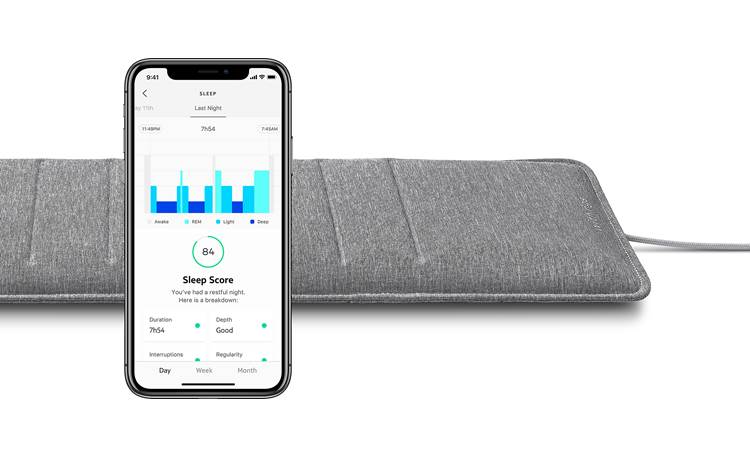
Key Features and Specs: Withings Sleep monitors sleep duration, onset, wake time, and sleep cycles (deep, light, REM), alongside heart rate and breathing interruptions. It calculates a Sleep Score using advanced sensors like pneumatic for respiratory rate and ballistocardiography, plus a sound sensor for snoring detection. Data syncs wirelessly to the Health Mate app on iOS and Android.
Pros: Withings Sleep provides accurate sleep data, detects apneas, and snoring, and monitors sleep depth effectively. It integrates well with other health monitoring devices like body composition scales and blood pressure monitors.
Cons: Some users find its data analysis slightly inaccurate, particularly in distinguishing between wakefulness and slight movements during sleep.
Price: $129.95
Website Link: Withings
How to Choose the Right Sleep Tracker for You
Now that you know what to look for, let's dive into these top sleep trackers and see which one might be the best fit for you. Choosing the right sleep tracker involves evaluating several key factors to ensure it meets your specific needs and preferences.
First, if you are into wearable sleep trackers, choose the tracker that feels most comfortable to wear. Wearable devices like smartwatches offer continuous monitoring and additional features like GPS and notifications, whereas non-wearable options like the Withings Sleep mat are discreet and easy to use without needing to wear them.
Next, assess the device's integration capabilities with your existing technology ecosystem. Most modern trackers sync data with companion apps on iOS and Android.
By evaluating these aspects—accuracy, additional metrics monitored, integration capabilities, form factor, and budget—you can choose a sleep tracker that aligns with your goals for improving sleep quality and overall health. Each device has unique strengths, so identifying your priorities will help you make an informed decision that enhances your well-being effectively.
Most accurate option
If you are interested in tracking sleep stages (deep, light, REM), devices like the Oura Ring Gen3 and Whoop 4.0 are renowned for their precise sleep tracking using advanced sensors like photoplethysmography (PPG) and accelerometers.
Top tracker with extra health metrics
If you are interested in additional health metrics such as heart rate variability (HRV) or respiratory rate monitoring, consider devices like the Garmin Epix Pro (Gen 2) or Apple Watch Series 9. These trackers excel in offering comprehensive health insights beyond just sleep tracking.
Best budget-friendly option
Finally, take into account your budget and ongoing expenses like subscriptions. While devices like the Fitbit Inspire 3 offer affordability with basic sleep tracking functionalities, premium options like the Garmin Epix Pro (Gen 2) come at a higher price point but offer advanced features and durability.
Types of Sleep Trackers
Sleep trackers come in two main styles: wearable and non-wearable. Wearable trackers, like wristbands and rings, are comfortable for most people and track your sleep right on your body. Non-wearable trackers, like mats under your bed or devices on your nightstand, keep an eye on your sleep from a distance without you needing to wear anything.
Wearable Sleep Trackers
Wristbands
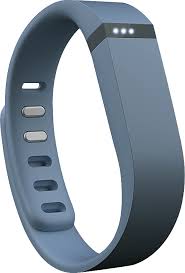
Wristbands are comfortable and track various sleep metrics such as duration, quality, stages, and heart rate. They are readily available, making them a convenient option for most users. However, their accuracy can vary, and some individuals may find them bulky or uncomfortable to wear throughout the night.
Pros
- Tracks various sleep metrics
- Comfortable to wear
Cons
- Accuracy can vary
Rings
![]()
Rings are discreet and comfortable for all-night wear, offering a good alternative for those who find wristbands uncomfortable. They track various sleep metrics, but their accuracy might be lower for some people compared to wristbands. Besides, the selection of sleep-tracking rings is more limited.
Pros
- Tracks various sleep metrics
- Comfortable for all-night wear
Cons
- Limited selection
Headbands
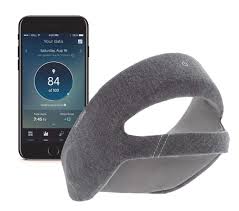
Headbands are a comfortable option for individuals who can't wear wristbands or rings. They track sleep stages and brain waves and offer deeper sleep insights. But it is to be noted that they are less common and might not track all desired metrics. Some users may find them uncomfortable and can bulky.
Pros
- Tracks sleep stages and brain waves
- Comprehensive sleep analysis
Cons
- Potentially bulky or disruptive during sleep
Chest straps
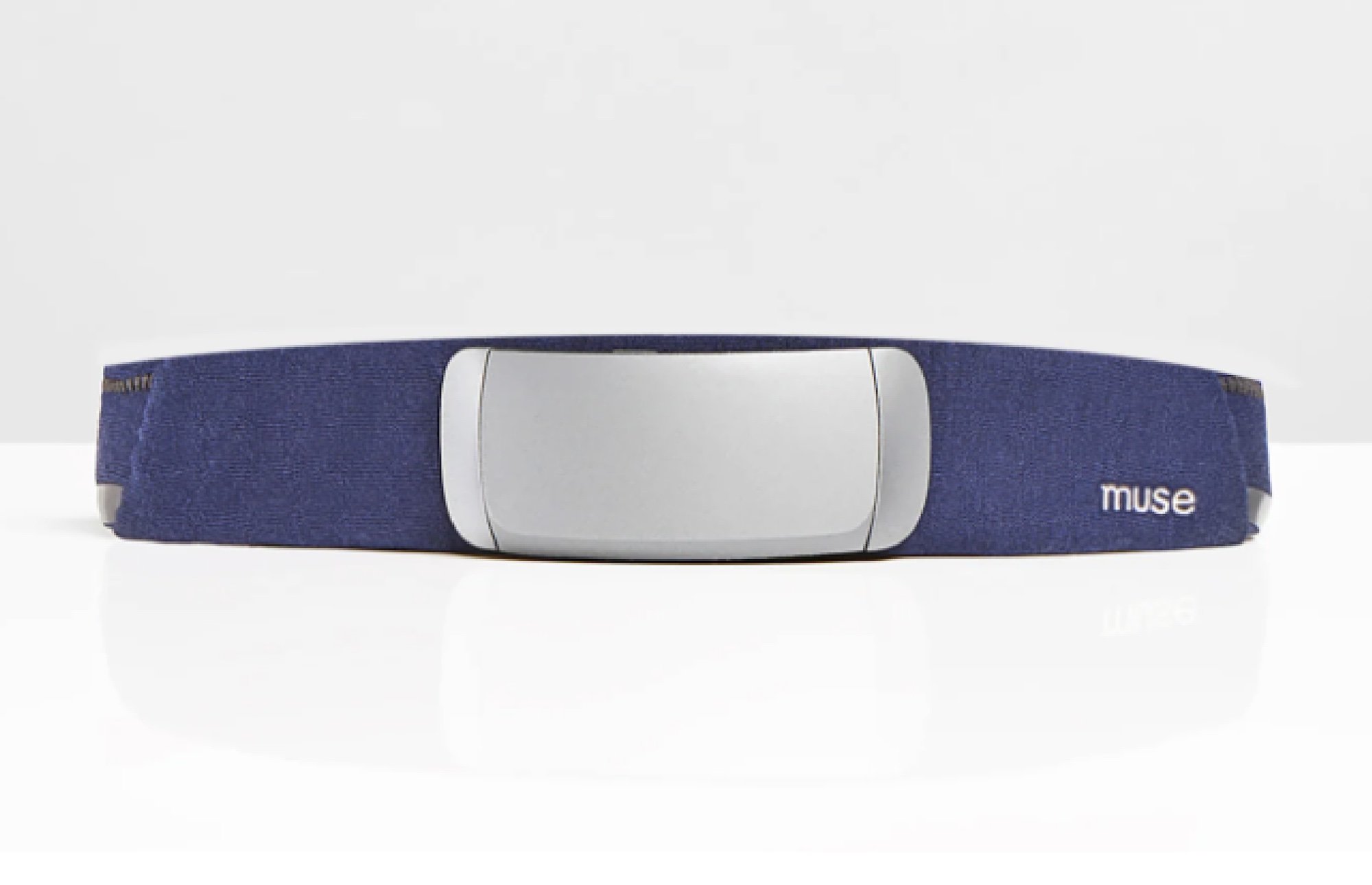
Chest straps are known for their high accuracy in sleep tracking and are valuable for monitoring sleep disorders. Despite their accuracy, they are the least comfortable to wear and might disrupt sleep for some individuals.
Pros
- Highly Accurate Sleep tracking
- Respiratory Data
- Long battery life
Cons
- Uncomfortable for some
- Limited Features
Non-Wearable Sleep Trackers
Under-mattress sensors
![]()
Under-mattress sensors offer a comfortable solution as they don't require wearing any devices. Sleep tracking mats monitor sleep movements effectively but might not be as accurate for restless sleepers. These sensors require proper placement under the mattress, which can be a minor inconvenience.
Pros
- No wearables needed
- Tracks sleep movement
Cons
- Might not be accurate for restless sleepers
Bedside monitors
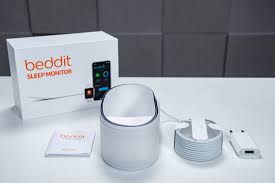
Bedside monitors track sleep from a distance, eliminating the need for wearables. While they offer convenience, the technology might be less proven compared to wearables, and they may not track all desired sleep metrics.
Pros
- No wearables needed
- Tracks sleep from a distance
- Real-time feedback
Cons
- Might not be accurate for restless sleepers
- Limited data
- Placement dependency
Key Features to Look for in a Sleep Tracker
Choosing a sleep tracker can be overwhelming due to the array of features available. Here are key factors to consider: prioritize data that matters (like sleep duration or detailed stages), opt for comfortable wearables for continuous use, check battery life, and assess ease of use and price. Let's explore each of these factors in more detail.
- Metrics tracked: Consider what sleep data is important to you. Basic trackers will track sleep duration and sleep quality, while more advanced trackers can track sleep stages (light, deep, and REM), heart rate variability, blood oxygen levels, respiration rate, and even room temperature and noise levels.
- Comfort: If you're not comfortable wearing the tracker, you're less likely to use it regularly. Consider the size, weight, and material of the tracker (like nylon), as well as how easy it is to put on and take off.
- Battery life: Some trackers need to be charged every night, while others can last for a week or more on a single charge. Consider how often you're willing to charge your tracker.
- Ease of use: Look for a sleep tracker that's a breeze to set up and use. The app should be simple and clear, giving you easy-to-understand breakdowns of your sleep data along with practical tips to improve your slumber. Remember to check user reviews before you buy to see what others think!
- Price: Sleep trackers range in price from around $30 to $300 or more. Consider how much you're willing to spend on a tracker before you buy one.
Closure
A sleep tracker can help you understand your sleep trends and overall sleep quality. With our handpicked 6 best sleep trackers you can get all the detailed information about your sleep habits and adjust changes to enhance the quality of your sleep. Before you add a sleep tracker to your shopping cart, closely examine its features to ensure they meet your needs. So, take control of your sleep and wake up feeling refreshed and ready to take on the day!
FAQ
How accurate are sleep trackers?
Sleep trackers are great for estimating sleep duration, but less precise for sleep stages and advanced metrics. They provide valuable insights, but for the most accurate picture, talk to a doctor about a sleep study.
How do sleep trackers work?
Sleep trackers use sensors to estimate your sleep. They primarily track movement (less movement means sleep) with accelerometers. Advanced trackers add sensors for heart rate or snoring sounds to give a better idea of your sleep quality. Remember, these are estimates, not clinically accurate measurements. For the most accurate sleep analysis, a sleep study is best.
How do sleep trackers measure sleep stages?
Sleep trackers estimate sleep stages (deep, light, REM) using accelerometers for movement detection, heart rate monitoring for variability, and respiratory rate changes. Less movement is linked to deeper sleep, while increased movement might indicate REM sleep.

